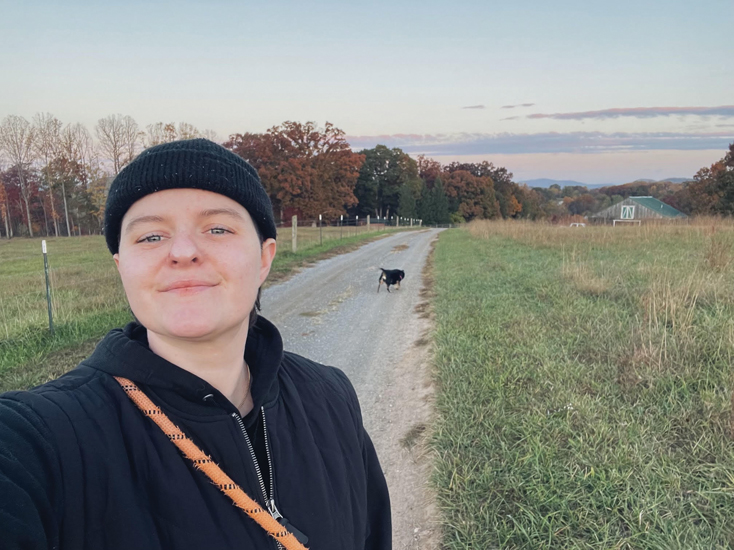Clock is TikTok-ing
TikTok creators brace for app ban
Darlene M. Johnson | 6/13/2024, 6 p.m.
Meghin Martin created a TikTok account two years ago to share her experience working at a local Starbucks. Under the username @ex_barista, Martin asked other TikTok users who worked at the coffeehouse chain if they had been scheduled for only five hours a week as they had. The short video received over 3 million views and comments from other Starbucks workers citing similar experiences.
“TikTok has really blown it up to where I can get thousands of people’s eyes or millions of people’s eyes on one video,” they said.
 Meghin Martin
Meghin Martin
Martin said their TikTok presence connected them with Starbucks Workers United, a union of Starbucks workers. Martin’s experience at the store was referenced in a Supreme Court briefing regarding the National Labor Review Board and Starbucks Corp.
Martin has since left Starbucks and now covers other social justice issues, such as the Israeli–Palestinian conflict. The 31-year-old said that broadening discussion topics increased the audience on the social media platform.
“I gained 5,000 followers once I started posting more explainer videos and focusing some on social justice and posting outside of the niche of being a Starbucks barista,” Martin said. “A lot of messages about what’s been going on in the world and social justice subjects have been able to spread as much as they have because of TikTok.”
But Martin, along with millions of other TikTok users, is at risk of losing their account. In April, President Biden signed a law to ban the app if it is not sold to a U.S.-approved buyer, by Jan. 19, 2025.
Selling on Social
Phyllis Kalu, 25, created a TikTok account in 2021 but didn’t use it for her herbal medicine company, Soul Earthy, until 2023. Kalu’s account, under the username @soulearthy_llc, has about nine thousand followers.
She said her TikTok presence has driven sales, helped her gain more recognition and grow her clientele.
“There’s no other platform in my opinion that has mastered the algorithm the way TikTok has,” Kalu said. “It’s very easy for people to find you just off posting a video.”
Kalu suggests utilizing TikTok to grow a business but warns it should always be used with other marketing strategies.
“I think [the TikTok ban] would hurt a lot of small businesses, but it should also be a lesson to everyone, specifically business owners, that we don’t technically own anything on the internet,” Kalu said. “Our accounts do not belong to us and really they can be stripped away at any given second. So the only place our work is really sustainable is in our communities.”
During the pandemic, Liz Brown listened to a daily morning podcast that featured interviews with real estate agents. The host asked each guest if they used TikTok for their business, and the answer was often “no.” After hearing that same answer repeated, Brown, 43, created her TikTok account in June 2020.
She has made at least one video every day since.
Brown, under the username @lizbrownrealtordaily, uses her platform to promote her realty business and provide video coaching to business owners. It was “easier” growing her account at first because it was like “getting to the party early” and she was one of the only real estate agents on TikTok.
“That being said, I think I got to 50,000 followers probably quicker than I got to 60 if you can even imagine that,” Brown said. “It’s just because I got there in the beginning, but it’s the consistency that continues to grow it. It’s changed my whole life.”
 Liz Brown
Liz Brown
The videos least expected to go viral can become the most popular, something Brown teaches her video clients. Sharing other parts of her life outside of her business, like her morning makeup routine, helped grow her account. Brown has also learned not to try to figure out how the algorithm works.
“TikTok is like playing the lottery … if you’re not playing, you’re never going to win,” she said.
Brown is bothered by the idea that a ban could end her ability to express herself on the platform.
“I want freedom, I want free speech and I feel like this platform, more than other platforms, has allowed that,” she said.
Legality Questioned
Many who oppose the ban of TikTok have cited infringement on First Amendment rights, including ByteDance, the creator of TikTok. The tech company has filed a lawsuit claiming that the ban on a communications platform is unconstitutional and that
Congress does not have the power to specifically name an app or platform when creating laws.
This potential ban is “unprecedented,” said Jim Gibson, a law professor at the University of Richmond. There has never been an instance where a single app is “essentially targeted on its own,” Gibson said.
A group of TikTok users have filed their own lawsuit against the federal government, alleging that a ban would restrict their freedom of expression.
“Regardless of whether TikTok has its own First Amendment rights, TikTok users can assert their own First Amendment rights,” Gibson said.
Those who support the TikTok ban, including U.S. legislators, have concerns about national security, what the company does with user data and that the platform is owned by a Chinese company that is subject to influence by their government.
Sen. Mark Warner discussed the app ban in a post from April 25 on X, stating, “To be clear, the law we just passed only forces a divestiture of TikTok from its parent company – which is legally required to do the bidding of the Chinese Communist Party.” He added that “TikTok can still exist & thrive in the US. It just can’t be controlled by one of our biggest adversaries.”
One person who has changed his mind about the platform is Republican presidential candidate Donald Trump, who joined TikTok recently despite attempting to ban the app during his presidency with an executive order.
Gibson said he expects the law to be vulnerable to challenges based on the First Amendment.
“If Congress had passed ... specific findings about TikTok’s practices that raise national security concerns or data privacy concerns then the courts have more to work with when it comes to justifying the ban,”
Gibson said. “When you simply ban or demand divestment of the company and you don’t really give much of an explanation, then it’s harder to justify under the First Amendment.”
Martin, the former Starbucks employee,, believes there will be “a lot of angry, angry people” if TikTok is banned and that it will be a detriment to the community.
“A lot of messages about … social justice subjects have been able to spread as much as they have because of TikTok,” Martin said. “... When you go and scroll through TikTok, you’ll actually see the people...posting about it. Getting it from the firsthand experience is more powerful...than hearing about it through the news.”
The lack of a solid explanation for why the ban should occur could make it easier to challenge. The lack of justification for the imposition of speech is also “very damaging to the bill’s ability to resist a First Amendment pushback,” Gibson said.







